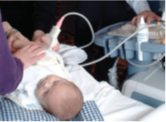Neurodiversity information for parents and young people
Why your baby has been referred for hip screening
We check every baby’s hips at birth and again at 6 to 8 weeks. This is part of a national screening programme called the Newborn Infant Physical Examination (NIPE).
We do this to check for a condition known as DDH (developmental dysplasia of the hip). We refer some babies for an additional examination and a hip ultrasound scan.
If your midwife or paediatrician identifies any risk factors, they will refer your baby to our Paediatric Hip Screening Clinic. Risk factors include breech presentation, foot positioning abnormalities and ‘clicky hips’.
If you have a close family member with a history of DDH that required treatment as a baby or child, we recommend that we screen your baby.
About DDH
DDH can occur when your baby’s hip ‘ball and socket’ joint does not fit snugly together. One or both hips may be affected.
Many babies have immature hips that get better without treatment. Approximately 1 in 1,000 children are born with a form of DDH that requires treatment. If detected early, DDH can be treated successfully in a relatively simple way for most babies.
There are varying degrees of DDH:
- If the socket (acetabulum) is more shallow than usual, this is known as acetabular dysplasia.
- If the ball does not fit as snugly and the joint is less stable, it may cause the ball to slide in and out of the socket. This is called a dislocatable hip.
- If the ball loses contact completely with the socket and stays outside the joint, this is called a dislocated hip.
What happens if your baby has DDH
If we detect that your baby has DDH, we will send you an appointment for your baby to attend the Children’s Outpatient Department at Kingston Hospital. The best time for babies to be seen is between 4 and 6 weeks old.
Important
If you don’t receive an appointment letter within this time period, contact the Paediatric Admin Team (see Contacts Section).
![]()
Contact the hospital if you are unable to attend the appointment.
Allow plenty of time to arrive for your appointment. It can be helpful to have time to feed your baby and change their nappy before the appointment.
What happens during the appointment
A specialist physiotherapist will see you, and the appointment will last around 15 minutes.
They will ask you questions about
- your pregnancy and delivery
- your baby’s general health
- whether there is a family history of hip problems
- any concerns you may have.

The physiotherapist will complete a brief clinical examination of your baby and use an ultrasound machine to scan your baby’s hips. The ultrasound machine works in the same way as an antenatal scan, by using sound waves to build up a picture of your baby’s hips. This is a safe and harmless procedure for your baby.
When you get the results
The physiotherapist will give you the results during the appointment and they will explain next steps. This could mean:
- Your baby’s hips are developing normally so no follow up is required and we will let your baby’s GP know the result.
- Your baby’s hips show a degree of immaturity and we will arrange a follow-up scan to monitor their development.
- Your baby’s hips show abnormalities and we will discuss further management and/or treatment with you.
More information
Contact information
Paediatric Admin Team: Monday to Friday, 9 am to 5 pm